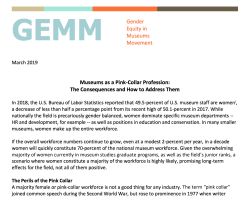Building an Empathetic Workplace Focused on Work
Posted: June 4, 2018 Filed under: Learning Organizations, Museum, museum staff, Organizational Values, Work Habits, Workplace Values | Tags: empathy, museums, nonprofit 1 Comment
The museum workplace is full of feelings: Success–you got the grant; terror–the second floor bath really leaked and your insurance deductible is that high; delight–a child told you this was the best school trip ever; accomplishment–you might actually finish cataloging that collection; anticipation–the fall benefit is tomorrow. All these feelings and emotions connect to work, but you’re not a product of artificial intelligence. You arrive every day with your own jumble of emotions, and it’s the moment where these two paths cross that we need to think about.
You’ve heard that oft-mentioned workplace trope, “We’re like a family.” Maybe. Strong families are committed. They communicate well and regularly. They are resilient. They share values and belief systems. They like spending time together, and they are affectionate. Those are all good things, although not all are workplace appropriate. In addition, not everyone working in your museum or heritage organization comes from a healthy family. Some arrive with a host of baggage. Advertising the workplace as a family sets it up as a place that fills a host of unmet needs. Work quickly becomes a spot where individuals feel comfortable discussing their failed relationships, their children’s problems or less dramatically, a venue where they let go of the frustrations of modern life. And while some colleagues share too much, others don’t share at all, yet their silence says everything. They can’t focus, are absent or on the phone frequently. When the over-arching culture says “We’re family,” it’s hard for museum colleagues (and leaders) to separate the hum of personal drama from the day-to-day at work or to know what level of help or participation is appropriate.
Once, a boss I didn’t much care for, an individual who met alcoholism head-on so he knew a bit about controlling feelings, told me that the hardest thing about work is exercising restraint. At the time, I brushed it off, but it’s stayed forever embedded on my personal hard drive, a home truth about saying less. That’s true both as a leader and a follower. It’s a reminder to all of us to create a museum culture for the public AND for staff that is warm, embracing and empathetic, but at the same time clear that our first priority is the communities we serve and the objects, living things and buildings we care for. In other words, work is about work.
Not being like a family doesn’t mean museum leaders can’t or shouldn’t address staff’s problems when they interfere with work. But here’s a caveat: Do your homework first. If you have an HR department, consult them. Know what you can and cannot say, and what you can and cannot offer, and whether HR needs to be in the room when you speak to your employee. Too often people suffer through massive personal drama because they’re ashamed of what’s happening to them. If you don’t have an HR department, use resources in your community — perhaps through your Chamber of Commerce — to get the advice and counsel you need. Make sure you’ve documented the employee’s behavior so you’re not offering vague descriptions that only add to the misery. If inattention costs your organization something, be prepared to explain. Work toward:
- Creating a climate where staff aren’t afraid to say they need to press pause.
- In the event of a personal tragedy, make sure staff know who to talk to.
- Remember that accident, illness or broken relationships can happen to anyone. Don’t blame an employee for circumstances beyond her control.
- Separate legitimate tragedy from a staff member who uses the museum to shed emotional load.
- Work with HR and your board personnel committee to understand what alternatives you might offer–sick leave, FMLA, short-term disability–and know what those mean.
- Build a museum workplace that is warm and empathetic, yet focused on work.
Joan Baldwin










[…] it be. I’ve written about this before, but your job, however intellectually stimulating is not your family. It may include some in your friend group, but hopefully it isn’t substituting for your […]